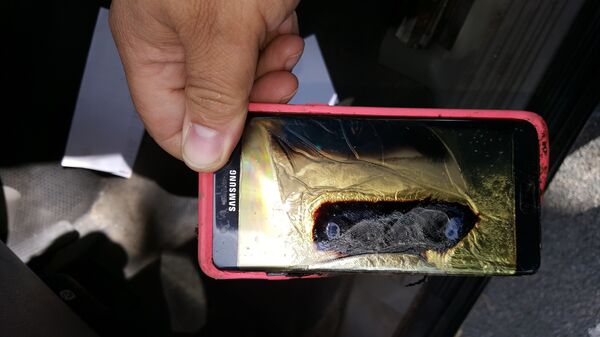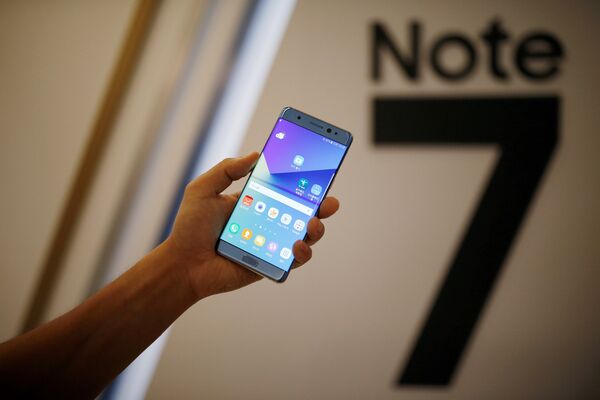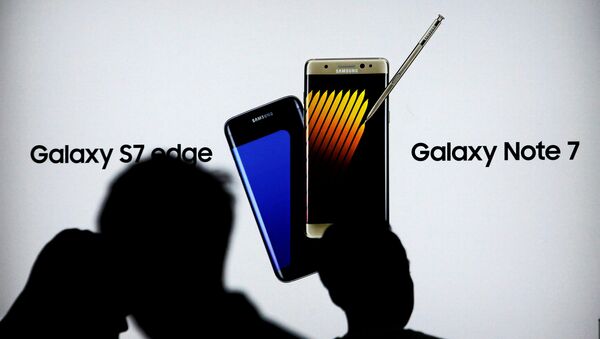For a minor tech startup, a debacle such as this would cause instant Armageddon. But for a major global player such as Samsung it would be expected that damage limitation could well be enough to ensure the broader retail operation doesn't completely sink.
Security Announcement in #CPH airport. It is forbidden to take the Samsung #GalaxyNote7 on board. What a disaster for the company's image!
— Emmanuel Crollen (@ecrollen) October 22, 2016
Lawrie Jones, managing director of UK-based tech PR company 42 Group, is optimistic about Samsung's ability to recover.
"Samsung have the size, financial might and the customer base to come back from this relatively unscathed in the long-term, but not to say that it will be an easy process in the short-term," Lawrie Jones told Sputnik.

"Part of the criticism stems from the fact that the tech giant was silent about the issues facing the phone, rather than acknowledging them. This meant that concerned customers didn't know whether their £700 (US$856) smartphone was a ticking time-bomb or not. The scale of the problem emerged rapidly through the press, which is the worst way for a crisis to develop. The aim must always be to stay on top of the narrative."
Taryn Langer, the founder of Moxie Communications, a tech PR company based in New York on the other hand, believes that, "Companies can make mistakes, but a series of mistakes is how big companies crumble."
"To move past this tech flop, Samsung needs to be 100% transparent. Consumers are willing to forgive mistakes if they believe the brand in question is addressing the problem properly," Ms. Langer told Sputnik.
She also added:
"Regular updates are compulsory so consumers don't feel like they're being kept in the dark. Releasing preliminary findings and expert thoughts on a Samsung-sponsored website designated specifically for Galaxy news in my opinion, would be a good thing to include in their communications strategy."

So what next for Samsung's PR strategy?
"Samsung has already delayed the release of the S8 to make sure it's safe, which is the right thing to do. They've already announced, it's going to be an awful lot cheaper than the Apple iPhone 8 which will mark its 10 year anniversary. What it needs to do now is to convince the public that it knows exactly what the problem was, has fixed it and will ensure that it won't happen again." Ms. Jones told Sputnik.
According to Ms. Jones, it could even spell good news for consumers as Samsung may decide to rapidly discount their mobile product range to re-capture their market share. Dusting themselves off from the lack of a cutting-edge phone for Christmas 2016 is just a bitter reality in the short-term, and simply provides rivals such as Apple with a bigger bite of the peak-season pie.
@PhoneBunch so Samsung will sue apple for copyright?
— Bhujangprasad (@lemonchusle) October 21, 2016
And Samsung are not the first major smartphone brand who have experienced a similar public relations challenge such as this:
"Apple had its own crisis with the iPhone 4 way back in 2010. Just hours after release, users quickly discovered that the device's antenna didn't actually work all that well, leading to Apple having to quickly find a solution — the pretty ugly, but functional bumper case. What Apple boss Steve Jobs did correctly was to acknowledge there was a problem quickly and offering an immediate solution. It cost Apple money, and the phones looked pretty unsightly, but it worked and the company was able to put a brave face on the crisis and move on."
How Samsung bounce back from the crisis is crucial for the company. Providing some advice for the brand's next moves, Ms. Jones suggested a focused, step-by-step approach:
"In a crisis, we advise the client does 3 things: Firstly you express pity, apologizing for whatever has happened. You praise your loyal customers and those who have invested in your brand in the past, and particularly those who have invested in the new phone. Finally you promise that this will never, ever happen again," she explained.
Jones also pointed out a key difference between Samsung and its main rival Apple in relation to their relationship with customers:
"Steve Jobs was the human face synonymous with the brand. When Apple experienced problems, people trusted that Steve would solve them, and he did. Samsung doesn't have this level of exposure or public recognition. The lack of personalization is a problem and should be addressed. Identify one person who speaks on behalf of the company to help re-dress the narrative, take responsibility for the problem and then deal with it."
For now, as the comedy memes continue on social media, and the ridicule of having a product that once set itself on fire may be the brunt of jokes for a little bit longer.
Samsung Note 7 lives on as a meme… pic.twitter.com/4tUrPG2AXj
— Victor R. Ocampo (@VictorOcampo) October 17, 2016
My #mematic Meme I just made haaaaaaaaa 😂😂😂😂 #Samsung pic.twitter.com/qvqlmwstA8
— Chef in the City© (@chef_angelwings) October 15, 2016
Samsung may not be sharing the joke currently, but they will certainly be hoping to have the last laugh in the long-term.


